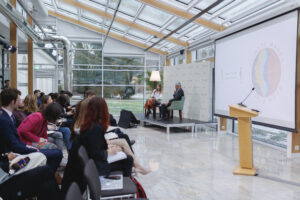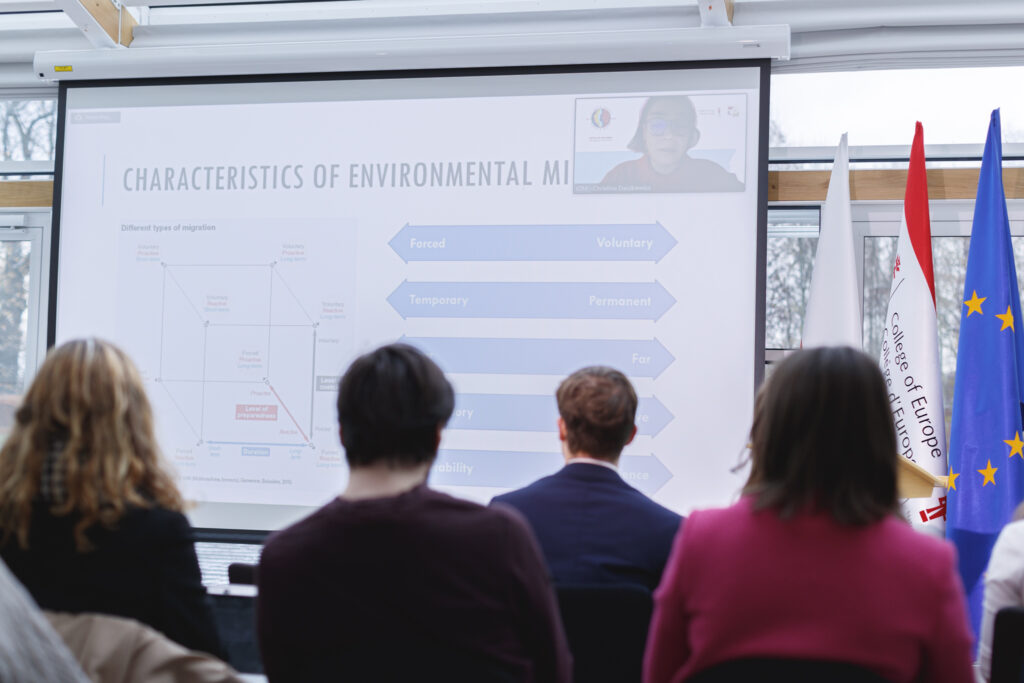As part of the Climate Makes People Move conference, hosted at the College of Europe in Natolin on 19 November 2022, the College welcomed a variety of experts to discuss the topic of climate-induced migration. The speakers touched on a broad range of subjects, from extreme flooding in Pakistan to the latest UN Climate Change Conference, COP27, in Sharm El Sheikh, Egypt. One key takeaway from the discussions nonetheless stood out: that climate-induced migration is inevitable and that we need to start talking about it.
Gaia Vince, the keynote speaker at the event, highlighted the need to view migration as a solution, with the power to bring benefits both to migrants themselves and to the countries which are receiving them. Particularly memorable was her impassioned – if idealistic – plea for fully-integrated, multicultural societies, and a shift away from regressive border policies dictated by political whims. Take, for example, the humanitarian crisis at the Polish-Belarusian border, in which thousands of refugees have been left stranded due to the failure of these governments to accept responsibility. Human lives should not be treated as political tools.
In this blog post we propose three themes that are essential to tackling the dual issues of forced migration and climate change that were discussed by the speakers during the event:
- Centring the narratives of those directly impacted;
- Creating inclusive and equitable policies that work for, and with, everyone;
- Informing everyone – from the policy-maker to the farmer.
Centring the narratives of those directly impacted
For far too long the narratives around climate and migration in the global North have been either too complicated, filled with academic jargon, or too simplified, using right-wing scare tactics denouncing the arrival of ‘hoards of migrants’. Instead, the narratives should shift focus and centre on those who are experiencing the issue first-hand, valorising their experiences while moving away from imposing our own western viewpoints. Contrary to what some right-wing media may proclaim, it must be noted that the vast majority of climate migration takes place within the global South – some 78%, according to the think tank Bruegel.[1]
How well do distant politicians and Brussels bureaucrats really understand how it feels to be torn from your ancestral lands and forced to relocate due to a climate crisis that is not of your doing? Not very, according to Hanne Wiegel, whose PhD research in Monte Patria demonstrates that the concept of ‘climate migration’ does not resonate with populations experiencing the phenomenon. After all, in 2021, Europe and the United States were responsible for around 33% of all global emissions, while Africa was responsible for only 4%.[2]

Creating policies that work for, and with, everyone
A key question that needs to be addressed is where does policy creation begin? Does it start at the top with the politicians removed from the problem? So far in this blog we have argued that no, if we create inclusive dialogues then we must create inclusive policies. First and foremost, this means the local level, with the communities most impacted by the effects of climate change. This, in effect, is Julia Guerin’s of the International Centre for Migration Policy Development ‘whole-of-society’ approach: engaging governments, civil society, academics, the private sector, and international organisations.
Nor should we forget the potential for data bias – the tendency to over-represent certain demographic groups, thus resulting in systematic discrimination and inapt policy outcomes. Julia Guerin suggests a solution to this issue: aggregating data by sex, to make sure that women are not being disproportionately affected by climate change. Hence the expediency of Julia Blocher’s call for tailored policy solutions, with the aim of taking the vulnerabilities of different demographic groups into account. The inclusion of environmental migrants within censuses would also help to raise awareness of the issue at large.
Informing everyone – from the policy-maker to the farmer
If any argument was echoed across the conference it was that knowledge is power. Knowledge is how we connect scientists, decision-makers, and local communities. But even if knowledge is power, knowledge does not belong only to those in power. For any solutions to be truly inclusive and equitable, everyone needs to be informed. Safietou Sanfo from WASCAL was clear on this point: we build resilience and sustainability in local communities by recognising indigenous knowledge and empowering the most vulnerable, including women and youth. Research has shown that climate change is not the sole factor causing migration. Socio-economic factors also play an important role. This is demonstrated in what Sanfo denounced as the ‘poverty-trap’. Low incomes lead to lower investment in agriculture, resulting in poor yields, and culminating in continued poverty. That is why an informed understanding of issues such as these is vital when developing solutions.
Science is at the heart of climate change research. So why, when there is so much science available and so much first-hand knowledge of the tangible effects of climate change – from drought in Chile to vicious heat in Qatar – can our ‘decision-makers’ not make a decision? The links between climate change and migration were made clear in each of the presentations during the Natolin conference. Yet at the highest level of climate policy, the COP27, climate-induced migration and displacement were still not officially on the agenda.[3] We must act now – or be stuck in a cycle of crisis management for decades to come.
Lucy Ward and Elizabeth Rees are students of European Interdisciplinary Studies at the College of Europe in Natolin in the David Sassoli promotion.
[1] https://www.bruegel.org/blog-post/climate-migration-what-do-we-really-know
[2] https://ourworldindata.org/co2-emissions
[3]https://issafrica.org/iss-today/could-cop27-still-shift-views-on-climate-migrants#:~:text=While%20climate%2Dlinked%20migration%20and,not%20officially%20on%20the%20agenda

